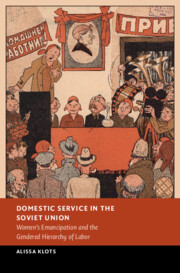Book contents
- Domestic Service in the Soviet Union
- New Studies in European History
- Domestic Service in the Soviet Union
- Copyright page
- Contents
- Figures
- Acknowledgments
- Introduction
- Prologue
- Part I Servants into Workers, 1920s
- Part I Introduction
- Chapter 1 From Exploitation to Socially Useful Labor
- Chapter 2 Just Like Any Other Worker? Class, Gender, and Labor Rights
- Chapter 3 Kitchen Maids in the School of Communism
- Chapter 4 The New Soviet Domestic Worker
- Part I Conclusion
- Part II In the Land of Victorious Socialism, 1930s–1950s
- Conclusion
- Bibliography
- Index
Chapter 4 - The New Soviet Domestic Worker
The Enlightenment Campaign and Domestic Workers’ Subjectivity
from Part I Introduction
Published online by Cambridge University Press: 25 April 2024
- Domestic Service in the Soviet Union
- New Studies in European History
- Domestic Service in the Soviet Union
- Copyright page
- Contents
- Figures
- Acknowledgments
- Introduction
- Prologue
- Part I Servants into Workers, 1920s
- Part I Introduction
- Chapter 1 From Exploitation to Socially Useful Labor
- Chapter 2 Just Like Any Other Worker? Class, Gender, and Labor Rights
- Chapter 3 Kitchen Maids in the School of Communism
- Chapter 4 The New Soviet Domestic Worker
- Part I Conclusion
- Part II In the Land of Victorious Socialism, 1930s–1950s
- Conclusion
- Bibliography
- Index
Summary
The union’s educational campaign was meant to reshape domestics to fit them into the proletarian mold. The union encouraged domestic workers to develop themselves through reading and writing, as well as participation in socialist leisure activities and revolutionary memory initiatives. This chapter demonstrates that ideas about class and gender fundamentally shaped the project of turning domestic servants of the old days into the “New Soviet Domestic Workers,” empowering them, but simultaneously limiting their agency. Domestic servants were subjected to the top-down cultural enlightenment program of the labor union because they were viewed not only as the least developed among the proletarians, due to their peasant background and their gender, but also as being in the closest proximity to their petty bourgeois employers. The labor union’s disciplinary approach, however, provided space for domestic workers to engage creatively with the official discourse and use it to claim a place in revolutionary society.
Keywords
- Type
- Chapter
- Information
- Domestic Service in the Soviet UnionWomen's Emancipation and the Gendered Hierarchy of Labor, pp. 115 - 144Publisher: Cambridge University PressPrint publication year: 2024

